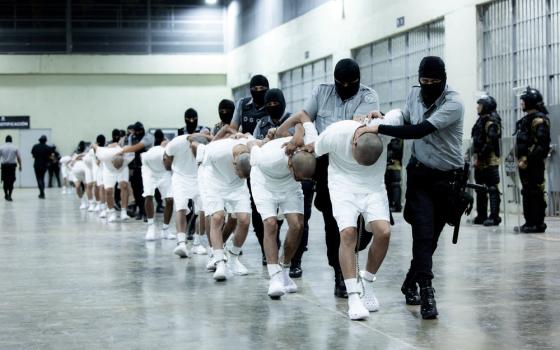By JOHN L. ALLEN JR.
New York
Benedict XVI’s image on his recent trip to Turkey was as an “unarmed prophet who spoke of peace, faith and love,” according to Secretary of State Cardinal Tarcisio Bertone, who said the visit dispelled an “erroneous interpretation” of the pope’s Sept. 12 lecture at the University of Regensburg, which touched off a firestorm of Muslim protest.
Bertone said that any “spirit of the Crusades, or of a clash of civilizations” is not part of the Catholic Church.
Bertone spoke in an interview with Italian journalist Gianni Cardinale, published Dec. 7 in L’Avvenire, the official newspaper of the Italian bishops.
Bertone said he was satisfied that, in the end, Turkish Prime Minister Recep Tayyip Erdogan met with the pope, especially since giving a political dimension to the visit was actually the Turks’ idea in the first place.
“It’s well-known that the Holy Father initially made clear his desire to take an exclusively spiritual trip, without stopping in the political capital of the country,” Bertone said. “It was the civil authorities who, legitimately, insisted that the trip also have a ‘political’ dimension, so to speak.”
“At that point, it would have been truly strange if those same authorities withdrew from a meeting with the pope. But it didn’t happen that way,” he said.
Asked about Benedict’s comments to Erdogan on Turkey’s candidacy for the European Union, Bertone largely repeated earlier Vatican clarifications.
“As is known, the Holy See does not have an official position on the entry of Turkey or any other country into the European Union,” Bertone said. “Neither could it have one; we don’t possess, and we wouldn’t want to, any political judgment in this sense.”
Yet Bertone stressed a key theme for Benedict in Turkey – religious freedom.
“Certainly the Holy See always hopes that the countries which form part of the European Union – all, without exception – fulfill the necessary conditions for integration, including respect for the liberty to publicly profess one’s own faith, which must be guaranteed to every person and to every religious community,” Bertone said.
“As the Holy Father said, Turkey is a bridge between Europe and Asia, and it can play a precious function in this sense given its peculiar configuration as a Muslim country, but at the same time, a ‘secular’ one.”
Bertone acknowledged that Benedict raised the issue of religious liberty on the trip, adding, “Now we hope that this appeal will be welcomed in the concrete, and not just in Turkey.”
On the subject of an alleged threat against the pope from Al-Qaeda that circulated while Benedict was in Turkey, Bertone said this was given “excessive weight” by the press, “which has its own mechanisms that are sometimes hard to understand.”
“On scores of Turkish and Arab television channels, all the Muslims could see this unarmed prophet who spoke of peace, faith and love,” Bertone said, referring to the pope.
Asked about Benedict’s moment of prayer in Istanbul’s Blue Mosque, Bertone defined it “a gesture inspired by the place and by the moment of intense spirituality which he was living.”
Finally, Cardinale asked Bertone about commentaries on Benedict’s trip from conservative European intellectuals known as “devout atheists,” who are not religious believers but who nevertheless support parts of the moral and social message of the Catholic Church. Some had hoped for a more “hawkish” line from Benedict in Turkey.
“It’s important to recall that the spirit of the Crusades, or of clashes of civilizations, are no longer part of the Catholic church, which always has at heart the fate of its own children in majority Muslim countries, but also the dignity of every person, whatever race, nation or religion they belong to,” Bertone said.
“If I can put it in a sound-bite,” Bertone said, “the church doesn’t really worry about atheists, however devout, because they’re out of her spiritual jurisdiction, so to speak. Much more worrisome are those inside the church who work to distort its faith and moral principles, or who oppose the pope and his design for renewal of the church.”
“But that,” Bertone said, “is another story.”




